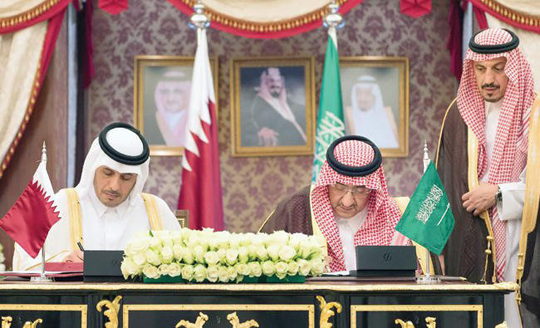Jeddah, May 3: During the fifth meeting of the Saudi-Qatari Coordination Council on Tuesday council members said they will use discretion in dealing with the various developments in Arab and Muslim countries to ensure the preservation of the safety and stability of these countries, and the prosperity of their peoples.

The meeting was chaired by Crown Prince Mohammed bin Naif, deputy prime minister and minister of interior, and Sheikh Abdullah bin Nasser Al-Thani, Qatari prime minister and minister of interior.
Meeting participants stressed that the fight against terrorism is a shared international responsibility that requires concerted international efforts at all levels: Security, thought, finance, media and military.
Prince Naif expressed satisfaction with the constructive cooperation between the two countries in all fields, made possible by “the guidance and support of the leadership of the two countries.”
The following joint statement was issued at the end of the meeting: Upon directions from the Saudi King Salman and the emir of Qatar, Sheikh Tamim bin Hamad Al-Thani, to develop and promote the relations between the two countries and to consolidate them in order to strengthen the distinguished ties between the two peoples, at the invitation of Prince Mohammed bin Naif, Sheikh Abdullah bin Nasser paid a visit to Saudi Arabia on Tuesday accompanied by a high-level delegation, the fifth meeting held by the Saudi-Qatari Coordination Council.
The council commended the positive results of the visit of King Salman to Qatar, which brought relations between the two countries to a new stage and which reflected the desire of the leadership of the two countries to promote integration in all fields.
The two sides exchanged views and in-depth talks that covered many bilateral and regional issues of common interest.
The two sides welcomed the release of Qatari and Saudi citizens who were abducted in Iraq, praising the efforts to secure their release and see them return safely to their countries and their families.
The council expresses satisfaction with the fact that this serious crisis came to an end.
Participants discussed bilateral cooperation in the various fields. Particularly, the council commended Saudi Arabia for hosting the “Made in Qatar” exhibition in 2016, the first place where it was held. The exhibition witnessed a positive interaction with the Saudi business community and served as an opportunity to broaden economic and trade relations between the two countries.
The two sides also welcomed the signing of an agreement in the field of air transport services, as well as the third executive program in the field of education between the ministries of education in the Kingdom of Saudi Arabia and Qatar.
Both the Saudi and the Qatari side presented a number of memorandums of understanding in many fields, with each promising to study them and present the results to the Joint Preparatory Committee of the Coordination Council at its next session.




Comments
Add new comment